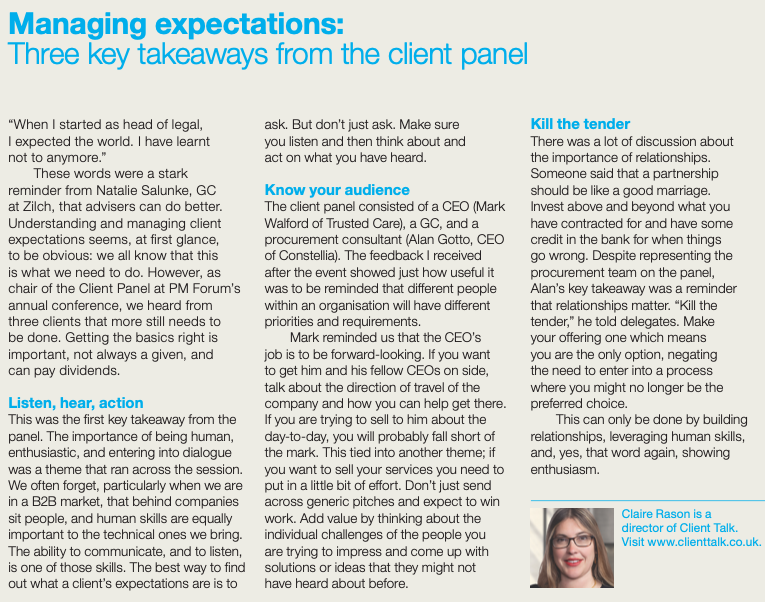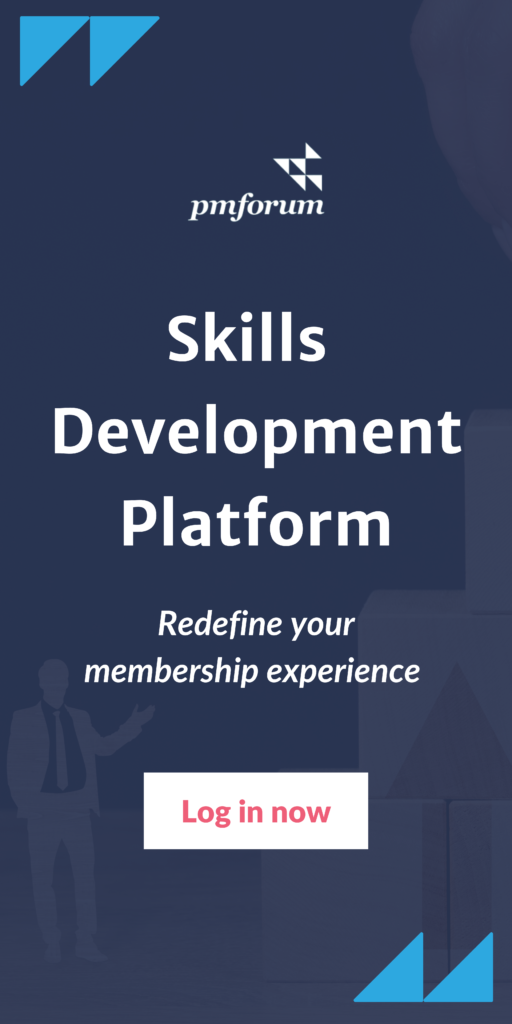The hugely popular PM Forum conference returned in September. Kim Tasso captures the day.
After two years online, you could feel the excitement of being face to face with 150 people in the TUC Conference Centre in London’s West End. There was a buzz in the air over the sea of familiar faces that was punctuated by plenty of new ones. Some firms were represented by their entire marketing and business development teams. Several had stayed in London overnight, having been to the PM Regional Committees meeting the day before.
Leor Franks of Kingsley Napley – a member of both the PM Forum and the Managing Partners’ Forum – chaired the event. His firm had postponed its partner away day to enable him to do so. He opened the day with a show of hands on how we were all feeling about the future. Despite a backdrop of headline- hitting economic turmoil, it was overwhelmingly positive. He advised delegates to focus on three key takeaways bearing in mind thefour Rs: Recognition, Reputation, Relationships and Revenue.
Having met Vlatka Hlupic, author of The Management Shift, I was looking forward to hearing her keynote speech on transforming culture, so I was disappointed that health issues prevented her from presenting. But we were assured she will appear at a future event and the team did a fab job of quickly and seamlessly reconfiguring the first part of the day.

Implement strategy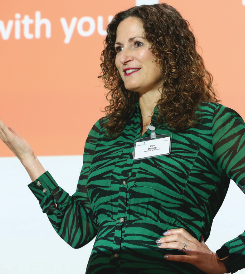
Whereas previous conference speakers focused on strategy development, Zoe Bailey of Withers & Rogers talked confidently through her pragmatic and elegant approach to strategy implementation. She used planning a holiday in Skiathos as a metaphor – making us all long for sunny days by the sea. And she intensified those feelings with an analogy of strategy as sailing a boat – anchored in culture.
Her key messages were:
- Build a strong force for change;
- Take people with you (by learning what’s important to them); and
- Be agile and responsive.
She explained her firm’s core purpose was to build trusting relationships and a vision of being independent, sustainably profitable, and global. This is supported by values to be collaborative, genuine and responsive.
She built her strategy implementation around GROW: Great people, Recognition, Operational Excellence and Winning work. The driving force of implementation was a core purpose, metrics and a competency framework supported by regular temperature checks of internal views. Who knew you could learn about strategy implementation by considering how to empty a dishwasher?
Develop Employer Value Propositions (EVPs)
Given the war for talent facing most professional services firms, next up were Joanne Nisbett of DAC Beachcroft (‘A life that works’ with Fully Flex built on three operating principles: client, team and output needs) and Andrew Baird of Blackbridge Consulting with a timely talk about employer brands.
‘Ninety-six per cent of companies believe the employer brand can positively impact recruitment’ and ‘64% of consumers stopped buying from a company after learning about poor employee conditions’ were just two of the eye-opening statistics they shared.
Employer brands – part of the corporate furniture – must be based on research (focus groups, workshops, competitor analysis, executive discussions etc.) and often exist on different channels to those frequented by clients. The Trainee Test app and podcast by Baker McKenzie, KPMG’s rhyming videos, and Linklater’s D&I PDF were persuasive illustrations.
Their six steps to building an employer brand:
- Understand organisational strategy and talent requirements.
- Research your EVP across key audiences.
- Build an EVP model, message framework and creative playbook.
- Collate relevant proof points, narratives and hero stories.
- Activate through selected channels
- Measure and adjust accordingly.
Their use of the Rooney vs. Vardy case (Wagatha Christie) when commenting on the relationship between HR and marketing raised some eyebrows.
Delegates commented on the similar themes (brand purpose and brand relevance) in a masterclass on refreshing your brand proposition by Kim Lansdown of Mishcon de Reya and Jamie Buchanan of BDD Perfect Storm.

Share storytelling skills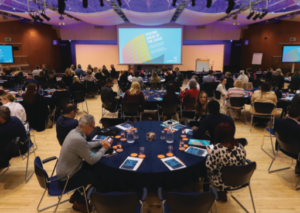
‘Facts tell, stories sell’ started the two- part overview on how stories can improve selling which was led by Meirion Jones in the morning and Geraint Evans, Head of Clients & Markets at CMS, after lunch. A distinctly Celtic-sounding double act.
With introductory neuroscience lessons (‘sensing, meaning, action’) and illustrations of cognitive bias, there was a fantastic example showing how a role-play story was used instead of a pitch to win an acquisitive media client using an inciting incident and escalation. Case studies, they argued, often lack relevance, drama and emotion – stories need scene-setting, disruption, resolution and engagement.
There was a recommendation for the book What great salespeople do – the science of selling through emotional connection and the power of story, by Michael Bosworth. And appealing to those of us who are fishing fans, they shared a precis of ‘Seven stories every salesperson must tell’ which follows the story arc:
Hook (to connect)
1. Personal story
2. Key team members
3. Company creation
Fight (differentiation)
4. Insight
5. Success
Land (agreement)
6. Values
7. Teaching
They mentioned other story structures – including the 12 stages of the hero’s story and shared how Accenture uses stories in pitches.
Meanwhile, elsewhere in the centre, a team from Man Bites Dog and Baker McKenzie led a masterclass on thought leadership as the smart growth strategy. I was sorry to have missed that one which, by several accounts, was insightful and practical in equal measure.
Sustain momentum
The post-prandial slot on leadership lessons from sport was enthusiastically led by Catherine Baker, former corporate lawyer, Trustee of the Dame Kelly Holmes Trust and Chair of the O-Shaped Lawyer. Several brave volunteers joined her on stage for a demonstration of performance coaching – using tennis balls.
Focus, purpose, fostering belonging, listening skills, leveraging strengths and managing energy were key themes. I suspect that we will all be taking micro-breaks and arranging post-match meals to improve future performance. And many are looking forward to her book launch in March 2023.
Deploy MarTech
Sam Taylor of Kingsley Napley and Simon Marshall of TBD Marketing ran a session on how (not) to deploy marketing technology. They shared their combined 35 years of professional services mistakes and lessons learned. They gave attendees ideas to keep their major marketing projects fun, engaging and on target.
Innovate client experience
Delegate Karen Millett of Veale Wasbrough Vizards summarised this session on new product development: “Tony Randle, a partner at Shoosmiths, was joined by Tim Pullan, CEO of ThoughtRiver, a contract analysis software company. The AI system reviews commercial contracts with 94% accuracy. Refuting concerns about cannibalising work, a key message was that if you don’t automate, someone else will. They have saved 10,000 hours of review time, identified 120,000 risks and acquired
20 major new clients – including some well-known brands – since launch in March 2021.”
 Hear the client voice
Hear the client voice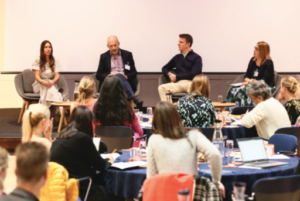
Listening to clients is a key function of marketing and business development and the final session is always a conference highlight. And this year was no different. Former Herbert Smith lawyer Claire Rason expertly interviewed a client panel comprising:
- Mark Walford, CEO of TrustedCare and founder of two other social care companies
- Natalie Alunk, General Counsel of fintech payments company Zilch
- Alan Gotto, chair of Consultancy Procurement Council.
Firms were urged to go back to basics in terms of managing client expectations. “Most firms want potential advisers to be enthusiastic about working together,” said Alan. Mark was keen for advisors to take the initiative and ask about imminent changes and to add value to his ideas. He said: “The most effective advisors look beyond the problem now and are upfront about bad ideas.” He disliked people sending him messages on LinkedIn and chasing him weekly but liked when advisors invested time to build a relationship and provided something different he can connect with – specific or bespoke ideas focusing on his pain points.
Natalie commented that she started “expecting the world” and “putting senior advisers on a pedestal” but was now more realistic. “Super-competent advice is in the equation – but I like timely, enthusiastic and added value advice. Open dialogue needs to happen.” She reflected that not many firms could do that consistently. During questions, she talked about adapting quickly using sprints but reflected that most law firms kept their innovation hub separate. She also questioned why NPS scores weren’t available for teams and individual lawyers.
Alan agreed that a two-way relationship and collaboration were important. It was fascinating to hear a procurement expert talking so passionately about the need for strong relationships. He also commented, “I want advisers to be my fixers and to blow the socks off my internal stakeholders.” He surprised us with: “Procurement hates tendering as they are busy, so sole sourcing is attractive.”
Summing up, Alan said there was intrinsic value in building relationships and collaboration was important. Mark wanted a symbiotic relationship and said that as CEO his role was to look to the future, and he wanted help with that. Natalie commented on human and listening skills and the need to understand what the client says: “Bring technical brilliance and human skills into the practice of law.”
 Closing thoughts
Closing thoughts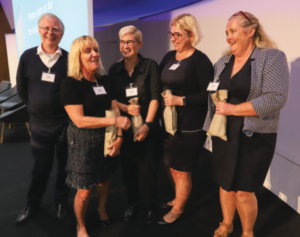
Leor rounded the day off by sharing his three takeaways: thinking about the five- chips approach to speaking in meetings to promote listening; using EVP to align strategy, the brand, and marketing and business development; and strategy needs follow through.
This was the first PM Conference since Nadia Cristina retired and the team did a superb job in ensuring everything ran smoothly. Richard Chaplin presented each of the organisers with a small ‘thank you’ gift before everyone moved to the drinks reception.
Most of the regular sponsors – Vuture, Mytton Williams, Thomson Reuters HighQ and Conscious – had stands in the refreshment area to facilitate conversation. It was interesting to learn how Ceros supports the creation of interactive pitch decks.
It was noticeable that the lion’s share of speakers represented law firms. Hopefully, at future conferences, we will hear more from our accountancy, consultancy and property colleagues. So adhering to good marketing practice, I’ll finish with that call to action.

 Kim Tasso is a psychologist and management consultant and Head of Training and Knowledge Transfer for MPF and PM Forum. www.kimtasso.com
Kim Tasso is a psychologist and management consultant and Head of Training and Knowledge Transfer for MPF and PM Forum. www.kimtasso.com
